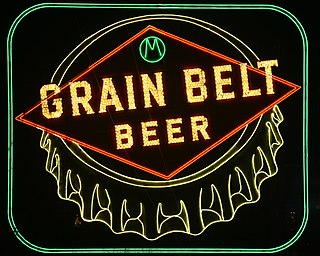
The Coors Brewing Company is an American brewery and beer company based in Golden, Colorado, that was founded in 1873. In 2005, Adolph Coors Company, the holding company that owned Coors Brewing, merged with Molson, Inc. to become Molson Coors. The first Coors brewery location in Golden, Colorado is the largest single brewing facility operating in the world.

Joseph Schlitz Brewing Company is an American brewery based in Milwaukee, Wisconsin, and was once the largest producer of beer in the United States. Its namesake beer, Schlitz, was known as "The beer that made Milwaukee famous" and was advertised with the slogan "When you're out of Schlitz, you're out of beer". Schlitz first became the largest beer producer in the US in 1902 and enjoyed that status at several points during the first half of the 20th century, exchanging the title with Anheuser-Busch multiple times during the 1950s.

Pittsburgh Brewing Company is a beer company headquartered in the Lawrenceville neighborhood of Pittsburgh, Pennsylvania, United States, best known for producing brands such as Iron City Beer, I.C. Light Beer, I.C. Light Mango, Old German, and Block House Brewing. Until August 2009, all production was conducted at its Lawrenceville facility. From August 2009 to 2021, their products were contract brewed at City Brewing Company in the facility that once produced Rolling Rock. On February 4, 2021, Iron City Beer's Instagram account announced that Pittsburgh Brewing Company would resume production of its own product in a new production brewery in Creighton, Pennsylvania, in the original Pittsburgh Plate Glass Company plant. At its opening, the facility is capable of producing 150,000 BBLs of beer annually.
Mickey's is a brand of malt liquor made by the Miller Brewing Company, a subsidiary of Molson Coors. It has a 5.6% ABV.

The Pabst Brewing Company is an American company that dates its origins to a brewing company founded in 1844 by Jacob Best and was, by 1889, named after Frederick Pabst. It outsources the brewing of over two dozen brands of beer and malt liquor. These include its own flagship Pabst Blue Ribbon, as well as brands from many defunct breweries.

Grain Belt is a brand of beer brewed in the American state of Minnesota, by the August Schell Brewing Company. The beer has been produced in a number of varieties. Grain Belt Golden was the original style introduced in 1893. The current offerings are: Grain Belt Premium, first introduced in 1947; Grain Belt Premium Light; Grain Belt Nordeast, introduced on April 7, 2010; and the newest offering, Grain Belt Lock & Dam, introduced in 2016. It was originally produced by the Minneapolis Brewing Company which formed with the merger of four smaller brewers in 1891. Soon after introduction, Grain Belt became the company's flagship product. It was brewed at the original Grain Belt brewery in Minneapolis, Minnesota until 1976. A series of other owners followed, and Schell took over the product line in 2002.

The Olympia Brewing Company was a brewery in the northwest United States, located in Tumwater, Washington, near Olympia. Founded in 1896 by Leopold Friederich Schmidt, it was bought by G. Heileman Brewing Company in 1983. Through a series of consolidations, it was acquired by Pabst Brewing Company in 1999; the Tumwater brewery was closed in 2003.

National Bohemian Beer, colloquially Natty Boh, is an American lager originating from Baltimore, Maryland. It was first brewed in 1885 by the National Brewing Company, but was eventually purchased by Pabst Brewing Company.

Drewrys Brewing Company is an American brewery located in McHenry, Illinois founded in 1877.

The G. Heileman Brewing Company of La Crosse, Wisconsin, United States, was a brewer that operated from 1858 to 1996. It was ultimately acquired by Stroh's. From 1872 until its acquisition, the brewery bore the family name of its co-founder and brewer Gottlieb Heileman.

Piels Beer, also called Piel Bros. Beer and Piel's Beer, is a regional lager beer, originally brewed in the East New York section of Brooklyn, New York City, at 315 Liberty Avenue.
Hudepohl Brewing Company is a brewery established in Cincinnati, Ohio in 1885 by founder Ludwig Hudepohl II. Hudepohl was the son of Ludwig Hudepohl who emigrated from Malgarten, Kingdom of Hannover, in 1838. Ludwig II had worked in the surgical tool business before starting his brewery. Hudepohl combined with Schoenling Brewing Company in 1986. Today, the Hudepohl-Schoenling Brewing Company is a wholly owned subsidiary of Christian Moerlein Brewing Company.

Rheingold Brewery, also referred to as Rheingold Breweries, or Liebmann Breweries, was the producer and marketer of Rheingold Beer from 1883 until 1987. This article is about both the brewery and its primary brand "Rheingold," which has been sold by other companies intermittently since Rheingold Brewery was ended.
Red White & Blue Beer was a brand of American beer, originally produced by the Pabst Brewing Company and later produced by G. Heileman Brewery of La Crosse, WI. Pre-Prohibition advertisements lauded its "mellow" taste and drinkability. Returning after Prohibition, the brand's name alone would have been a selling point, during the patriotic American sensibilities of World War II and after.

Since it earliest days, the economy of Louisville, Kentucky, has been underpinned by the shipping and cargo industries. Today, Louisville is home to dozens of companies and organizations across several industrial classifications.

George Wiedemann Sr. was a German-American brewer.
The Kingsbury Breweries Company was founded in 1847, at which time it was the Kunz & Bleser Brewing Company. The main location was Manitowoc, Wisconsin, with other locations in Sheboygan, Wisconsin and St. Paul, Minnesota. In 1926, the firm was sold to the Manitowoc Products Company and was known as the Gutsch Brewery.

The Christian Schmidt Brewing Company was an American brewing company headquartered in Philadelphia, Pennsylvania. Founded in 1860, it was the largest brewing company in the history of Philadelphia, producing nearly 4,000,000 barrels of beer a year in the late 1970s. When it closed in 1987, it marked the first time in over 300 years that there was no brewery operating in Philadelphia.

The Jacob Schmidt Brewing Company is a former brewing company that was located at 882 W. Seventh Street in Saint Paul, Minnesota. Founded in 1855, the brewery was originally known as the Christopher Stahlmann Cave Brewery.















